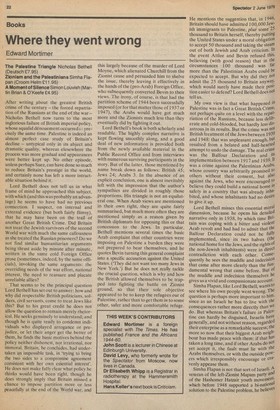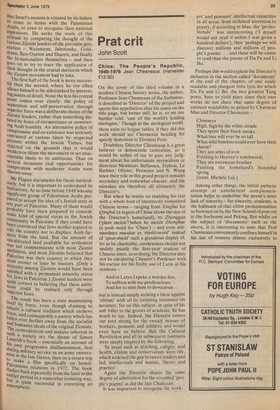Where they went wrong
Edward Mortimer
The Palestine Triangle Nicholas Bethell (Deutsch £7.95)
Zionism and the Palestinians Simha Flapan (C room Helm £11.95) A Moment of Silence Simon Louvish (Martin Brian & O'Keefe £4.95) After writing about the greatest British crime of the century — the forced repatriation of the Russians at the end of the war — Nicholas Bethel! now turns to the most inglorious failure of British imperial policy, whose squalid denouement occurred t.. precisely the same time. Palestine is indeed an almost perfect case study of Britain's decline — untypical only in its abject and dramatic quality, whereas elesewhere the process was more gradual and appearances were better kept up. No other episode, unless perhaps Suez, can have done so much to reduce Britain's prestige in the world, and certainly none has left a more intractable situation behind it.
Lord Bethel] does not tell us in what frame of mind he approached this subject, with which (and this was probably an advantage) he seems to have had no previous connection. I suspect, on internal and external evidence (but both fairly flimsy), that he may have been on the trail of another Great British Crime. Did Britain not treat the Jewish survivors of the second World war with much the same callousness as she treated the Russian prisoners? Do we not find similar humanitarian arguments being thrust aside by minute after minute, written in the same cold Foreign Office prose (sometimes, indeed, by the same officials). invoking the same arguments: the overriding needs of the war effort, national interest, the need to reassure and placate unreliable allies?
That seems to be the principal question Lord Bethel] has set out to answer: how and why did respectable British politicians, soldiers, civil servants, come to treat Jews like this? But to his great credit he does not allow the question to remain merely rhetorical. He seeks genuinely to understand; and though he is quite ready to condemn individuals who displayed arrogance or prejudice, or let their anger get the better of them, he finds the basic motives behind the policy neither dishonest, nor irrational, nor immoral. Britain, he concludes, had undertaken an impossible task, in 'trying to bring the two sides to a compromise agreement consistent with her own essential interest'. He does not make fully clear what policy he thinks would have been right, though he does strongly imply that Britain missed a chance to impose partition more or less peacefully at the end of the World war, and this largely because of the murder of Lord Moyne, which alienated Churchill from the Zionist cause and persuaded him to shelve the issue, thereby leaving it effectively in the hands of the (pro-Arab) Foreign Office, who subsequently converted Bevin to their views. The irony, of course, is that had the partition scheme of 1944 been successfully imposed (or for that matter those of 1937 or 1947), the Arabs would have got much more and the Zionists much less than they eventually did by fighting it out.
Lord Bethell's book is both scholarly and readable. The highly complex narrative is kept flowing smoothly along, and a good deal of new information is provided both from the newly available material in the Public Record Office and from interviews with numerous surviving participants in the story. But of the latter, those mentioned by .name break down as follows: British 45; Jews 24; Arabs 3. In the absence of an explicit conclusion, one is almost inevitably left with the impression that the author's sympathies are divided in roughly those proportions. His triangle is not an equilateral one. When Arab views are mentioned in their own right, they are quite fairly summarised, but much more often they are mentioned simply as a reason given by British diplomats for opposing this or that concession to the Jews. In particular, Bethell mentions several times the basic Arab complaint that other countries were imposing on Palestine a burden they were not prepared to bear themselves, and he quotes Bevin turning this general complaint into a specific accusation against the United States. (They did not want too many Jews in New York.') But he does not really tackle the crucial question, which is why and how the British allowed themselves to be trapped into fighting the battle on Zionist ground, so that their sole objective appeared to be to keep the refugees out of Palestine, rather than to get them in to some other, safer and more comfortable refuge. He mentions the suggestion that, in 1946, Britain should have admitted 100,000 Jewish immigrants to Palestine, plus some 25 thousand to Britain herself, thereby putting the United States under a moral obligation to accept 50 thousand and taking the steam out of both Jewish and Arab criticism. In the event Attlee and Sevin refused this, believing (with good reason) that in the circumstances 100 thousand was far more than the Palestinian Arabs could be expected to accept. But why did they nut admit the 25 thousand to Britain anywaY, which would surely have made their position easier to defend? Lord Bethell does net tell us.
My own view is that what happened in Palestine was in fact a Great British Crime, not perhaps quite on a level with the repatriation of the Russians, because less deliberate and cold-blooded, but hardly less disastrous,in its results. But the crime was not British treatment of the Jews between 1939 and 1948: that was unpleasant enough, but resulted from a belated and half-hearted attempt to undo the damage. The real crime was the Balfour Declaration and itS implementation between 1917 and 1939. It was a crime against the Palestinian Arabs, whose country was arbitrarily promised to others without their consent, but alse against the Jews, who were encouraged to believe they could build a national home bl safety in a country that was already inhabited, and whose inhabitants had no desire to give it up. Lord Bethell misses this essential moral dimension, because he opens his detailed narrative only in 1938, by which time Britain was coping with a bitter and violent Arab revolt and had had to admit that the Balfour Declaration could not be fullY implemented, since its two halves (the national home for the Jews, and the rights of the non-Jewish inhabitants) were in direct contradiction with each other. Consequently he sees the muddle and indecision that came after more clearly than the fundamental wrong that came before. But of the muddle and indecision themselves be gives us a vivid and compassionate account. Simha Flapan, like Lord Bethel!, wants to see where his own people went wrong. The question is perhaps more important to him, since as an Israeli he has to live with the consequences rather more directly than We do. But whereas Britain's failure in Palestine can hardly be disguised, Israelis have generally, and not without reason, regarded their enterprise as a remarkable success; the more so now that their biggest Arab neigh" bour has made peace with them: if that has taken a long time, and if other Arabs do nut yet accept it, the fault must lie with the Arabs themselves, or with the outside powers which irresponsibly encourage or cravenly appease them. Simha Flapan is not that sort of Israeli. A veteran of the left-Zionist Mapam partY and of the Hashomer Hatzair youth movement: which before 1948 supported a bi-national solution to the Palestine problem, he believes that Israel's success is vitiated by its failure to come to terms with the Palestinian Arabs, or even to recognise their national aspirations. He seeks the roots of this attitude by comparing the thought of the various Zionist leaders of the pre-state generation — Weizmann, Jabotinsky, Goldmann, Ben-Gurion and Sharett, and finally the bi-nationalists themselves — and then goes on to try to trace the application of their thought in the crucial decisions which the Zionist movement had to take.
The first half of the book is more successful than the second, where he too often allows himself to be sidetracked by interesting points of detail. None the less his central Point comes over clearly: the policy of separation and self-preservation through stinerior force was a deliberate choice of the Zionist leaders, rather than something dictated by force of circumstance or unwavering Arab hostility. An alternative policy of compromise and co-existence was seriously canvassed at various times by respected Persons within the Jewish Yishuv, but rejected on the grounds that it would Weaken or dilute the movement or set unacceptable limits to its ambitions. Thus on several occasions real opportunities for compromise with moderate Arabs were thrown away.
Mr Flapan documents his thesis meticule.uslY, but it is important to understand its limitations. At no time before 1948 was any significant group of Palestinian Arabs prepared to accept the idea of a Jewish state in any Part of Palestine. Many of them would Probably have been prepared to concede some kind of special status to the Jewish community in Palestine if they could have been convinced that Jews neither aspired to rule the country nor to displace Arab farmers from the land. But the amount of uncultivated land available for settlement Was not commensurate with most Zionist ambitions, and most Zionists believed that Palestine was their country in which they must sooner or later be masters. (Only a minority among Zionists would have been satisfied with a permanent minority status for. Jews in Palestine.) Zionist leaders were quite correct in believing that these ambitions could be realised only through superior force. itself The result has been a state maintaining by force, even though claiming to Merit a cultural tradition which eschews IPrce; and consequently a society which has 'alien ever further away from the socialist Ind humanist ideals of the original Zionists. he contradictions and malaise inherent in !och a society are the theme of Simon ouvish's book — essentially an account of is .0vv ... e progressive disillusionment, first e progressive disillusionment, first u nng military service as an army cameraman in the late Sixties, then on a return trip make a film specifically on IsraeliPalestinian relations in 1972. The book flashes back repeatedly from the later to the leather period in a somewhat irritating way, Lit is quite successful in conveying an atmosp here.
THIS WEEK'S CONTRIBUTORS Edward Mortimer is a foreign specialist with The Times. He has published France and the Africans 1944-60.
John Scott is a lecturer in Chinese at Edinburgh University.
David Levy, who formerly wrote for the Spectator from Moscow, now lives in Canada.
Dr Elisabeth VVhipp is a Registrar in radiotherapy at the Hammersmith Hospital.
Hans Keller's next book is Criticism.







































 Previous page
Previous page